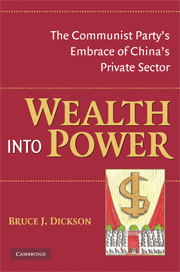Book contents
- Frontmatter
- Contents
- List of Tables and Figure
- Acknowledgments
- 1 Introduction
- 2 The Party's Promotion of the Private Sector
- 3 Co-opting the Capitalists
- 4 Bridges and Branches: The CCP's Institutional Links to the Private Sector
- 5 Views on the Economic, Political, and Social Environments
- 6 Private Entrepreneurs in Public Service: Participation in China's Formal Political Institutions
- 7 The Ripple Effects of Privatization: Corruption, Inequality, and Charity
- 8 Conclusion
- Appendix: Survey Design
- Bibliography
- Index
6 - Private Entrepreneurs in Public Service: Participation in China's Formal Political Institutions
Published online by Cambridge University Press: 05 September 2012
- Frontmatter
- Contents
- List of Tables and Figure
- Acknowledgments
- 1 Introduction
- 2 The Party's Promotion of the Private Sector
- 3 Co-opting the Capitalists
- 4 Bridges and Branches: The CCP's Institutional Links to the Private Sector
- 5 Views on the Economic, Political, and Social Environments
- 6 Private Entrepreneurs in Public Service: Participation in China's Formal Political Institutions
- 7 The Ripple Effects of Privatization: Corruption, Inequality, and Charity
- 8 Conclusion
- Appendix: Survey Design
- Bibliography
- Index
Summary
Throughout the reform era, the CCP has focused on economic development as its main task. Since the 1990s, it has increasingly relied on the private sector to provide the economic growth that the party's leaders believe is necessary to maintain the legitimacy it needs to keep itself in power. In order to promote cooperation between the party and the private sector, the CCP has gradually integrated entrepreneurs into the Chinese political system. As noted in Chapter 3, large numbers of private entrepreneurs have become members of the political elite by joining the CCP. In addition to being members of the party, many entrepreneurs also belong to other prominent political bodies, further integrating them into the political system.
Previous research into the political participation of China's entrepreneurs has generally focused on the motives of the entrepreneurs themselves. This assumes that entrepreneurs who enter the political arena are primarily self-selected, but in fact that is only one part of the equation. Because the CCP plays an influential role in deciding who may participate in China's formal political institutions, it is also necessary to inquire into its strategy for deciding which entrepreneurs will be allowed to participate. As will be shown throughout this chapter, many of the same characteristics that explain which entrepreneurs are co-opted into the party also help explain which ones are active in the political process. Both the entrepreneurs' interest in joining the political world and the willingness of local officials to grant them access must be examined to properly understand political participation by China's entrepreneurs.
- Type
- Chapter
- Information
- Wealth into PowerThe Communist Party's Embrace of China's Private Sector, pp. 167 - 198Publisher: Cambridge University PressPrint publication year: 2008



